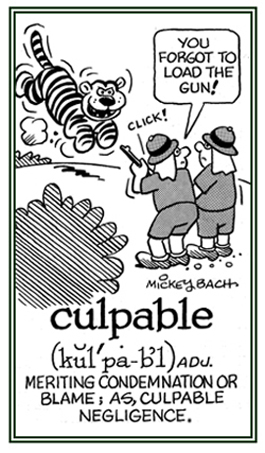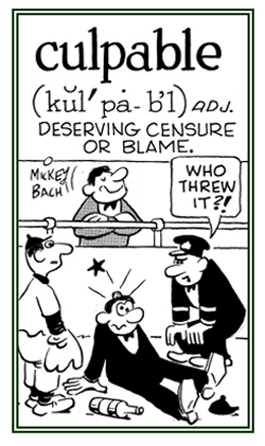culpa-
(Latin: blame; responsible for wrong or error)
There are three degrees of culpa:
- Lata culpa, a gross fault or neglect.
- Levis culpa, ordinary fault or neglect.
- Levissima culpa, slight fault or neglect.
Culpability, blameworthiness. Except in cases of absolute liability, a person's criminal culpability requires demonstrable proof that he/she acted purposely, knowingly, recklessly or negligently, as the law may require, with respect to each material element of the offense.
Culpable conduct, blamable; censurable; criminal; at fault; involving the breach of a legal duty or the commission of a fault. That which is deserving of moral blame. It implies that the act or conduct spoken of is reprehensible or wrong, but not that it involves malice or a guilty purpose.
Culpa caret qui scit sed prohibere non potest. He/She is clear of blame who knows, but cannot prevent.
Culpa est immiscere se rei ad se non pertinenti. It is a fault for any one to meddle in a matter not pertaining to him/her.
Culpa in contrahendo. Term used to describe the liability that attaches to a breach of contract, especially a breach by the offeror after the offeree has begun performance in a unilateral contract and is stopped by the offeror before completion of the performance that is also the acceptance of the offer in a unilateral contract. [Would you consider this typical legalese?].
Culpa lata dolo equiparatur. Gross negligence is held to be equivalent to intentional wrong.
Culpa tenet [teneat] suos auctores. Misconduct binds [should bind] its own authors. It is a never-failing axiom that every one is accountable for his own delicts.
Culprit, one accused or charged with a commission of a crime. Also, commonly used to mean one who is guilty of a crime or a legal fault.
In explanations and predictions of human action and inaction culpability is a measure of the degree to which an agent, such as a person, can be held morally or legally responsible.
Culpability marks the dividing line between moral evil, like murder, for which someone may be held responsible, and natural evil, like earthquakes, for which no one can be held responsible.
Sometimes an individual is just as culpable of a wrongdoing when he or she watches someone else doing something illegal and does not notify the authorities.
At the trial, the defendant was charged with culpable negligence for driving through a red traffic light.
President Trump denies any culpable responsibility for the chaos that exists in his staff.


Go to this Word A Day Revisited Index
so you can see more of Mickey Bach's cartoons.
This principle has long been considered a cornerstone of criminal justice. A problem with this principle lies in the changing mood of the public, so what once appeared to be appropriate punishment for a given crime may now appear too lenient or too harsh.
Also interpreted to mean: "The sins of the fathers." Is it possible that what we say and do now may affect future generations?
Horace was warning anyone contemplating the commission of a crime that it is very possible that he/she will be punished!
2. Someone who is arraigned or charged for an offense or crime.
3. Someone who is guilty of a fault or crime.
4. A person who perpetrates wrongdoing.

